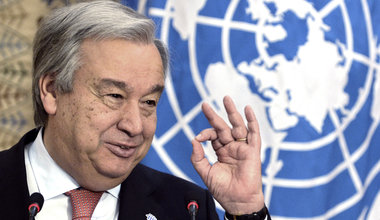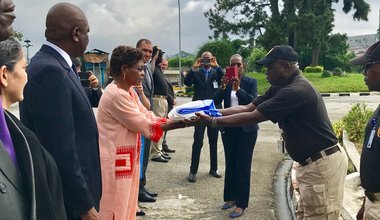International press review, 1 December 2008
COTE D'IVOIRE: Farmers return to land in west after deadly clashes, Irinnews, 28 November 2008- Some 70 long-displaced farmers returned this week to a cocoa plantation in western Côte d'Ivoire, despite deadly clashes triggered when armed youths tried to block their return. UN and local officials say the clashes - in the sub-prefecture of Zeaglo, some 450km northwest of the commercial capital Abidjan - underscore the importance of reconciliation efforts in the volatile west, a zone long wracked by land disputes and hit by some of the worst violence during the country's six-year conflict.
"This is an isolated case but it is clear that social cohesion efforts are extremely important," the UN humanitarian coordinator and deputy special representative for the Secretary-General, Georg Charpentier, told IRIN. "In most places returns have worked very well. But there are some pockets of resistance and this will need some more intensive [reconciliation] efforts." On 20 November rifle-wielding youths attacked a convoy - organised by local authorities and escorted by security forces - bringing 81 returnees to farms near Zeaglo, according to the UN Office for the Coordination of Humanitarian Affairs (OCHA) in Côte d'Ivoire. Hundreds of farmers have already resettled in the region but the plantation to which farmers were to have returned on 20 November is being claimed by a local cooperative (...) UN and local officials said it appears some unemployed local youths were manipulated by people with economic interests in the plantation. They said most residents were on board for the return of farmers - immigrants or descendants of immigrants from neighbouring countries as well as Ivorians, all displaced by conflict. "Youths in Zeaglo are caught between local authorities advocating reconciliation and cooperation among communities, and a group of individuals who are trying to sow division for their own interests," said Gnonsékan Martin, prefect of Blolequin, the prefecture in which Zeaglo is located. He said since conflict drove farmers off the land, locals have been cultivating much of it, but the situation has now changed. "The war is over, the situation is normalised. It is time for the illegal occupants of this land to [adjust accordingly]." (...) As Côte d'Ivoire struggles to restore stability, one major challenge is the return of the thousands of farmers who fled cocoa plantations in the west. In the past few years families have been gradually returning to the land they farmed before the 2002 rebellion. Even before the conflict, land tenure issues were a source of tension in Côte d'Ivoire, which West African migrant workers helped make the world's top cocoa producer. Recognising local tensions surrounding the return of farmers to Zeaglo, the authorities and the UN have held numerous meetings to stave off problems. In July 2008 local residents and returnees agreed on a formula for sharing the land, said the UN's Charpentier, who attended the meeting. "Both sides had agreed at the time," Charpentier told IRIN. "Now, despite that, there has been this resistance." (...) UN and local officials said despite the setback they were confident that all the families would soon be able to return to the plantation. Prefect Gnonsékan said an investigation was under way into the Zeaglo incidents (...)
Côte d'Ivoire : le parti présidentiel appelle au désarmement et à la réunification du pays, Xinhua, 30 novembre 2008- Le Front populaire ivoirien ( FPI, au pouvoir) appelle le gouvernement ivoirien à faire du désarmement et de la réunification sa "principale priorité" pour une sortie de crise par des élections fiables et apaisées. "Le FPI lance un appel solennel au président de la République et au Premier ministre de faire du désarmement et de la réunification du pays leur principale priorité et agissent afin que les élections se tiennent dans un pays pacifié, réunifié, normalisé ", indique une déclaration de son président Pascal Affi N'Guessan publiée samedi par la presse nationale. Le président du FPI dénonce également la partition du pays malgré la signature de l'accord de Ouagadougou qui a prévu le désarmement et la restauration de l'autorité de l'Etat sur l'ensemble du territoire national avec la nomination du chef de l'ex-rébellion comme Premier Ministre. "Pourquoi deux ans après, le pays est-il toujours coupé en deux? Quand le Premier ministre cessera d'être le chef d'une rébellion? Comment peut-on parler d'élections ouvertes, justes et transparentes dans les conditions actuelles?", s'interroge le FPI. "Tout est vain si le désarmement des combattants et la restauration de l'autorité de l'Etat sur l'ensemble du territoire ne sont pas effectifs", estime le parti du président Laurent Gbagbo. "Des élections sans désarmement n'ont pas de sens et signifient l'échec de l'accord de Ouagadougou", ajoute encore le FPI qui pense qu'il faut éviter qu'on ne se retrouve dans "la situation de la RD Congo où après les élections, il y a encore la guerre" (...)
Deux blessés graves dans les affrontements entre jeunesses politiques en Côte d'Ivoire, Apanews, 30 novembre 2008- Des Jeunes de partis politiques rivaux de Côte d'Ivoire se sont violemment affrontés dimanche après midi à Guibéroua (centre ouest), faisant deux blessés graves, selon une source proche de l'une des parties (...)
La fin du recensement électoral à Abidjan reportee au 14 décembre prochain, Apanews, 29 novembre 2008- La fin de l'opération d'identification et d'enrôlement des populations dans le district d'Abidjan, initialement prévue soir s'achever ce samedi soir a été reportée au 14 décembre prochain, sur instruction du Premier ministre ivoirien, Guillaume Soro, en accord avec le président de la commission électorale indépendante (CEI), Robert Beugré Mambé.
 ONU
ONU Nations Unies Maintien de la paix
Nations Unies Maintien de la paix



